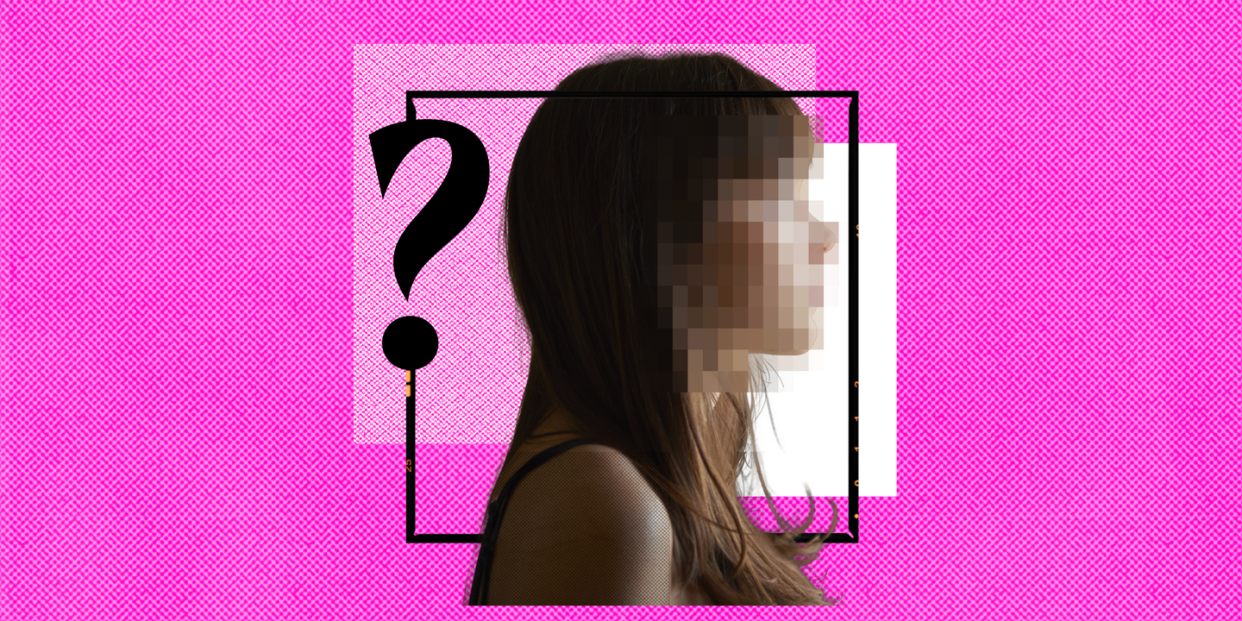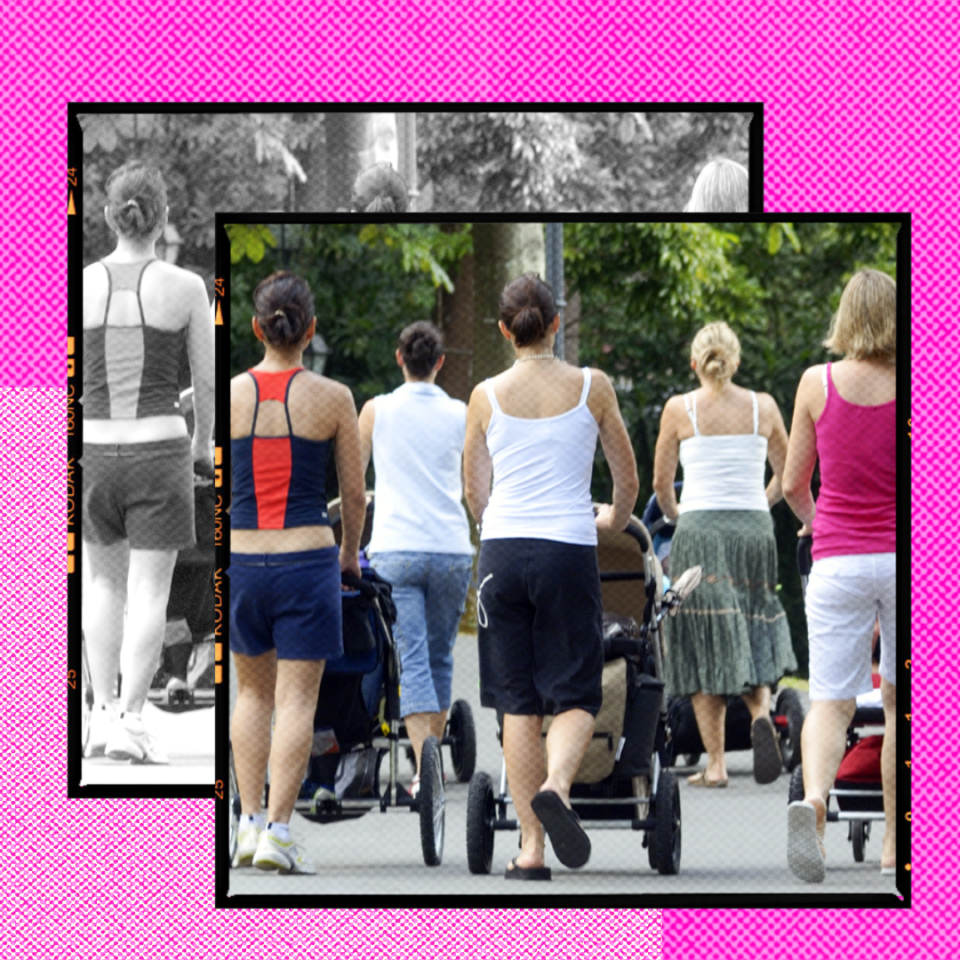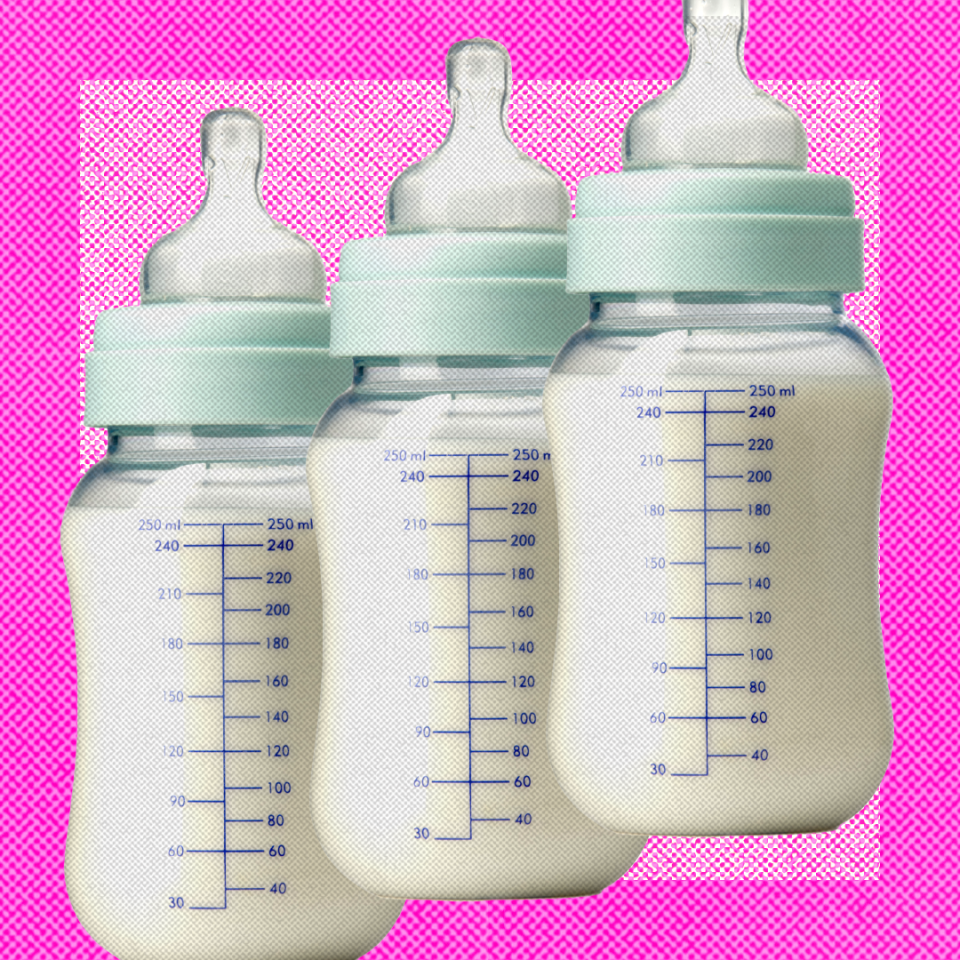"I can't decide if I want a baby; it feels an impossible choice"

On Tuesday evening, with margarita salt coating my lips and while surrounded by great company, I knew what I wanted. Confirmed. Sorted. I wanted this – random weekday nights going to art galleries, laughing until 1am and the freedom to spend my money pretty much only on myself… I’d officially decided that my future would be child-free.
But by Wednesday lunchtime, I’d changed my mind. Because there, distorted by my cracked iPhone’s screen, was a tiny pair of eyes – freshly opened, and looking on in wonder at the world. One of my most precious friends had had her second baby, and wow, I wondered – what must that feel like? To see a tiny hand that you created clutch yours? That’s what I wanted.
This emotional yo-yo, the swing between wanting and not wanting children, is one that has gripped me for the past three years. Unlike friends who've always known that they do want children, and those who decided long ago parenthood isn’t for them, I'm in a constant state of indecision.
The question claws at me. It’s there when I turn on the TV and BBC iPlayer asks “add child.” It’s there when I open up Instagram and see blurry scans, friends cradling bumps and children, strawberry-smeared faces grinning at me. I go to my local park and watch women push their buggies round in circles, my own head twisting and turning with them as I ask: ‘do I want this?’ Some friends are now on their second and third children, while I let months race by, uhhming and ahhing and wishing I could just make a fucking decision.
And it's a decision I'll need to make, if not soon, then definitely within the next few years. I’m about to turn 37 and – as many headlines, experts and MPs consistently tell me – my ‘time is running out’. But how do I go about making one of the few life decisions that cannot be reversed? I decided to see if the experts could help.
The mum mentor
“Can you see yourself as a mother?” asks Ann Davidman, in her soft Californian lilt. She's a motherhood clarity mentor, which means – for the past 25 years – she's been helping people with their decision on parenthood. This question, one I've asked myself over and over again, feels different from her. She tells me to answer it from deep within my gut.
I try to clear my head. Take a breath.
“No,” I say.
Before hastily adding. “Not right now, any way.”
Digging deeper, she asks why I answered this way.
"I'm happy in my life and career..." I say. "And..."
"And?"
The 'and' is harder to answer. It's to do with what I see around me, other people's circumstances. I've kept a lot of this internal tug of war quiet, as it makes me feel guilty. It's a choice I can (I think, as nothing is for sure) make.
I've watched friends who are trying, or who want to get pregnant, experience huge anguish when they see pregnancy announcements. These are people undergoing IVF, adoption, egg-freezing and those in queer couples facing barriers to fertility treatment. They’re putting themselves under great emotional, physical and financial strain to start families. I don’t feel the same. I start fretting about: my free time, my financial freedom, my sleep (I’m – look away, new parents – a solid ten-hours a night girl.) Case closed right? I don’t want children. If I did, I’d know. I’d be willing to make those sacrifices. But how is that others are so sure? Am I selfish for not wanting to do this?
“We live in this society where the message is that you should want children, you should have them and so people who don’t know feel broken,” explains Ann. “But it’s not just this natural thing you should know – this is a personal decision and you decide what’s best for you.”
It seemed obvious – before speaking to Ann – that the only way to make this decision was to search for clues within the lives of others. I can spend whole evenings picturing myself in my friend's shoes, watching them, trying to copy and paste myself into their homes. But, Ann explained that this constant looking outwards, won't help. Their fears, desires, pasts cannot match mine. If I did have children my life would not look like that of those I compare myself too.
And – of course – the circumstances surrounding becoming a parent aren't easy. While I chastise myself for the seemingly 'selfish' reasons for not becoming a mother, my career and financial freedom are serious considerations that aren't just about enjoying being able to splash out on new jeans, festival tickets and oat flat whites.
Around 54,000 women each year lose their job simply for getting pregnant. And 390,000 working mums experience negative and potentially discriminatory treatment at work each year. These numbers have almost doubled in a decade. The cost of childcare is so astronomically high that one in five UK parents have considered quitting their jobs.

I've also – it seems – over-simplified the decision of other people. In my mind they always knew. But it's just not true. From speaking to many parents I've learned that while some people did know for sure, others didn’t. They made a decision that felt right at the time; had they made the other choice, that could also have felt right.
“I don’t see this decision as wrong or right, good or bad,” explains Ann. “But people want to do right by a child, they don’t want to be miserable. It’s the most common discussed fear – regret. Then there are others: how their life will change, their sleep, their age, their relationship status, climate change… it goes on."
But with all of that swirling around, how will I ever make a decision? What if fear freezes me in place until it's too late?
Digging Deep
As we chat, Ann wants to make something clear: I probably won't figure out what I want by writing this feature. Which, considering my entire career has been about decoding my feelings via writing about them, comes as a minor irritation. But I also get it – this is the biggest decision of my life. But still, I just want an answer.
Ann offers four-month courses (she's also written a book on the topic with Denise L Carlini) that get to the very root of what someone actually wants, by taking away the external factors clouding this decision (career, the environment etc) and going deep into the subconscious. This is, she says, because many of us do what I've been doing – allow our decision be controlled by externals. These are important but they have to be separated from what our true desire is.
“The struggle boils down to trying to figure out what you want and what you’re going to do about it at the same time. That’s what causes the mental gridlock. You have to separate them,” she explains.
I found this really hard to understand. Money, sleep, time, lifestyle will all, ultimately, contribute to how good a parent I am... if I decide to become one, is it not irresponsible to ignore these things? But Ann isn't saying these things aren't important. She's saying placing so much emphasise on them is pushing down our true wants. It boils down to listening to our hearts, not our heads. Well, at first...
Because Ann has clients who – through the process – decided that they did want children, but only under certain circumstances. And those who want to be parents but decide they won't due to the environment. Essentially what I want, and what I act upon are two different things.
Often, the initial fears that guide this decision are all to do with the action itself – the having of the children, rather than our wants. It’s why her course involves a series of writing prompts which “have been designed to poke at your unconscious, so that you get new information on what is inside that you don’t even know is playing out [in your life and decision.] Any time we’re focused on the future, mostly it’s about the past – something in your past needs looking at. As we have no idea how the future will unfold.”
How we were mothered
Shortly after my mum died (of a brain tumour, when I was 19), I found a list she'd made. It was double-sided, in her ornamental scrawl, and contained all the things she wanted to achieve. There were so many ambitions she hadn’t ticked off. I quickly folded it up, placing it, eyes closed, in a random book hoping to never find it again.
I remembered this when Ann told me that one of tasks on her course is to “think about the beliefs you have, as to what motherhood is and how your mother would define motherhood.” Our childhood impacts so much, including this. It's all written under our skin, we just can't read it clearly.
I start thinking about how my own mum felt about motherhood and how it impacted me. An obvious blocker is, of course, her death and the profound impact it has had on me – do I not want children as I’ve seen that death is never far away? The risk of raising a baby knowing that they could end up motherless is (perhaps) more heightened, so could be causing a blockage? But when I begin to write the memory of that list is what surfaces.
My mum, like me, was ambitious. And while she achieved so much (she was a journalist and wrote two feminist non-fiction books) there were also times she took on jobs she didn’t enjoy – in order to pay for mine and my sister’s upbringing. She sacrificed for us. Was it worth it? Was I worth all she gave up? I stop writing, there are some things you can never know.

Set paths
There was a time, six years ago, when I was so sure of what I wanted. The sun was shining, I was sitting, my head in my boyfriend’s lap when he casually said: “I don’t know if I want kids.” I sat up suddenly, stomach churning. His comment resulted in a serious conversation in which I said, “if you don’t want kids and I do, then we'd have to break up.” I was so convinced motherhood was in my future that I would have been willing to leave behind the man I’ve now loved for 17 years. So what’s changed?
The thing is, back then, I was about to turn 30. A heightened time where it felt like everyone had been given a list to check off – the things that made us a ‘success’. For so many, despite being in seemingly modern times, it involved: career, find a partner, marry partner, have kids… (with a side order of buying houses.) It was all so… boring. Yet I fell head over heels for it.
We’d go to weddings and I’d drink all the free wine, then drunkenly cry, demanding when my boyfriend was going to propose. Innocent questions of “when will it be you two?” felt loaded – as if I was a failure for not having “tied my man down”. Ridiculous, yes. But also incredibly real. These false ideals of what a successful life looks like are so deep within us that often we can be racing along a set path, certain it’s what we want, without stopping to question ‘why’?
It was only after years of blindly racing along this path, after I got married, then started to try for a baby (my husband was willing to put his reservations aside and see what happened) that I was able to stop and consider how much society’s expectations had influenced my life thus far. I’d love to say this came from some huge spiritual awakening, but instead it came in the form of a huge dermoid cyst, that was found – after two years off of birth control – clinging determinedly to my left ovary. It had to be operated on, in the middle of a pandemic, and the whole thing put pause to my husband and I’s efforts.
Having something literally stand in the way of my quest to become a mother led me to question why I wanted to be one in the first place. The answers pretty much boiled down to ‘because everyone else is’ and ‘I don’t want to get left behind.’ In our conversation when Ann questioned whether I wished I wanted to be a mother, I’d replied yes. Why? “Because it would be so much simpler.” Why? “Because that’s what society wants of me.”
I can recognise this is ridiculous. That following what others want isn't the best route to happiness but still, I will feel like a failure if I don't live up to those expectations. I am still far from free from the invisible grasp society holds me in. Shamefully – when I’m considering motherhood – I'm also thinking of my value as a woman. How so much of how we're raised tells us it lies first in our looks (by which I mean the false cultural idea of what makes someone attractive), then when they ‘go’ it’s our ‘motherly’ qualities that are the most praised. What am I worth… if I end up with neither?
If you’re screaming at me, good. You should be angry. I’m angry at myself for placing such value in attractiveness and motherhood. Of course I know there’s so much more to all of us than just those two things. But we live in a misogynistic society, messages of this ilk have surrounded me my whole life. It would be impossible for them not to have been absorbed. And all of these thoughts of value and worth hit me, hard, the morning after my 36th birthday.
There have been many ridiculous headlines recently, reminding women not to ‘forget’ to have children. Turning 35 has long been a landmark birthday for my friends and I, simply because, it’s when we’re told our fertility ‘drops off a cliff’. Everyone’s body is different but the much quoted one in three women, aged 35 to 39, will not be pregnant after a year's trying? That's based on data from 1700s France. Yes, really.
Despite knowing this, my age and what’s going on inside my body hangs over me. So I decided to seek out reassurance. The Fit For Fertility assessment at Lister Fertility Clinic assesses (to the best of their knowledge) what's going on and can offer guidance on when to start trying. After a blood test and a scan to count my follicles (egg reserve) – all pretty painless – I wait a few days for my results. I don't want to go into any detail, but I was told all is healthy. This is consistent with the latest medical research, which has shown that the average age of the menopause has gone up. This information is a balm, I no longer wake up at night fearing my body and what's going on inside.
Decision time
This feature, I confess, has been sat in drafts for months. I wanted Ann to be wrong. I wanted to be the exception, to show that in the course of writing this I'd 100% know. But, I've come to realise, I don't think I'll ever 100% know. This is true for all of us, for all future decisions, not just this one. There will always be paths we could have gone down and we will never be able to rewind time, to see what they would have been like. It's part of the joy of living.
At this moment, I feel content being child-free. There may be minutes, days, hours, even years that I regret this decision. That, I'll have to accept, is part of the yo-yo. I've lost so much in my life, through both circumstance and decisions, but I've also gained so much. I just have to keep pursuing joy and contentment. Knowing that while my family, made up of my wild, wonderful friends and relatives, may not look like what society expects, it's mine – and it makes me incredibly happy.
Follow Catriona on Instagram and Twitter
You Might Also Like
